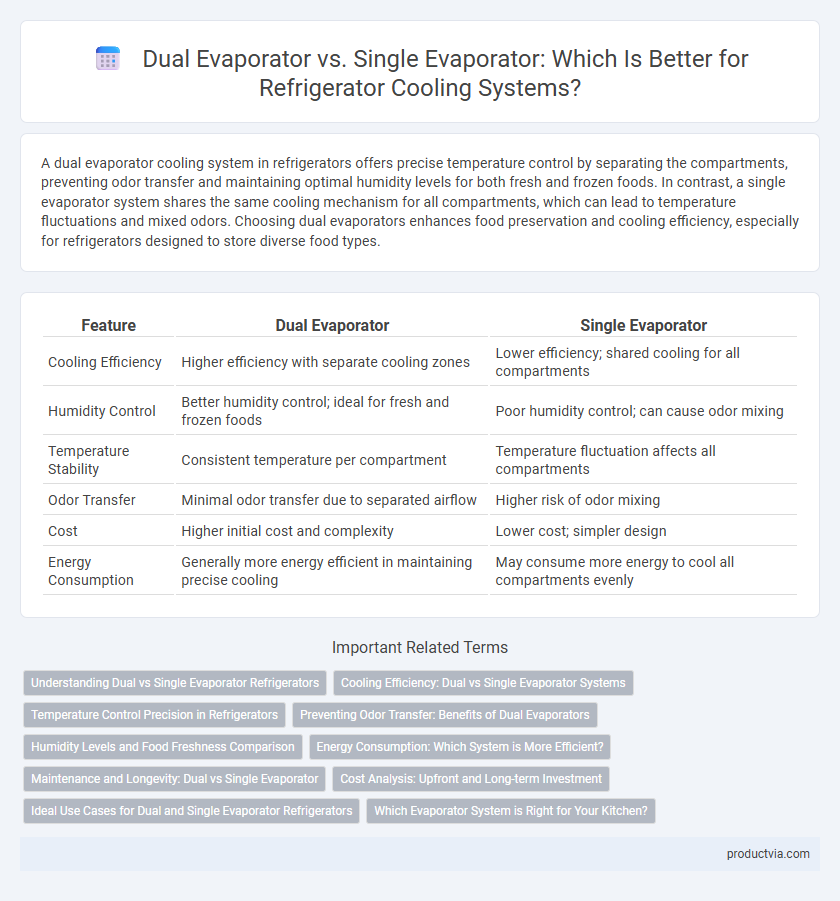A dual evaporator cooling system in refrigerators offers precise temperature control by separating the compartments, preventing odor transfer and maintaining optimal humidity levels for both fresh and frozen foods. In contrast, a single evaporator system shares the same cooling mechanism for all compartments, which can lead to temperature fluctuations and mixed odors. Choosing dual evaporators enhances food preservation and cooling efficiency, especially for refrigerators designed to store diverse food types.
Table of Comparison
| Feature | Dual Evaporator | Single Evaporator |
|---|---|---|
| Cooling Efficiency | Higher efficiency with separate cooling zones | Lower efficiency; shared cooling for all compartments |
| Humidity Control | Better humidity control; ideal for fresh and frozen foods | Poor humidity control; can cause odor mixing |
| Temperature Stability | Consistent temperature per compartment | Temperature fluctuation affects all compartments |
| Odor Transfer | Minimal odor transfer due to separated airflow | Higher risk of odor mixing |
| Cost | Higher initial cost and complexity | Lower cost; simpler design |
| Energy Consumption | Generally more energy efficient in maintaining precise cooling | May consume more energy to cool all compartments evenly |
Understanding Dual vs Single Evaporator Refrigerators
Dual evaporator refrigerators use two separate evaporators to independently control the fridge and freezer compartments, enhancing temperature precision and reducing humidity transfer. Single evaporator systems rely on one evaporator to cool both compartments, often causing less consistent temperatures and increased frost buildup. Choosing dual evaporators improves food preservation by maintaining optimal humidity and preventing odor mixing between compartments.
Cooling Efficiency: Dual vs Single Evaporator Systems
Dual evaporator systems significantly enhance cooling efficiency by independently controlling the temperature and humidity in the fridge and freezer compartments, reducing frost buildup and preventing odor transfer. Single evaporator systems circulate air from one cooling source, often causing temperature fluctuations and moisture imbalance that result in faster spoilage of stored food. The precise climate control of dual evaporators leads to improved food preservation and energy savings compared to single evaporator models.
Temperature Control Precision in Refrigerators
Dual evaporator refrigerators offer superior temperature control precision by independently regulating the cooling for the fridge and freezer compartments, minimizing temperature fluctuations and cross-contamination of odors. Single evaporator systems share the cooling source between compartments, leading to less accurate temperature maintenance and potential humidity issues. Enhanced separation in dual evaporator designs ensures optimal freshness and consistent cooling performance across different storage zones.
Preventing Odor Transfer: Benefits of Dual Evaporators
Dual evaporator refrigerators feature separate cooling systems for the fresh food and freezer compartments, effectively preventing odor transfer between sections. This design maintains distinct humidity levels and temperature controls, preserving food freshness and minimizing cross-contamination of smells. Single evaporator models often allow air circulation between compartments, increasing the risk of mixed odors and compromised food quality.
Humidity Levels and Food Freshness Comparison
Dual evaporator refrigerators maintain optimal humidity levels by independently controlling the freezer and refrigerator compartments, which prevents odor transfer and keeps produce fresher longer. Single evaporator systems share the same cooling source, leading to lower humidity control and potential moisture loss that can cause food to spoil faster. Studies show dual evaporator units significantly enhance food preservation by maintaining higher humidity, reducing dehydration, and minimizing bacterial growth.
Energy Consumption: Which System is More Efficient?
Dual evaporator systems in refrigerators typically offer better energy efficiency by maintaining separate cooling zones, reducing temperature fluctuations and minimizing compressor workload. Single evaporator units often consume more energy as they rely on one cooling source for both fresh and freezer compartments, causing the compressor to work harder to regulate consistent temperatures. Energy consumption studies show that dual evaporator refrigerators can save up to 10-15% in electricity usage compared to single evaporator models.
Maintenance and Longevity: Dual vs Single Evaporator
Dual evaporator refrigerators offer improved maintenance ease and longer system longevity due to separate cooling circuits that reduce cross-contamination and frost buildup. Single evaporator models may require more frequent defrost cycles and maintenance to prevent odor transfer and temperature inconsistency, potentially shortening the compressor's lifespan. Efficient temperature control in dual evaporator systems minimizes wear and tear, resulting in extended durability and reduced service costs.
Cost Analysis: Upfront and Long-term Investment
Dual evaporator refrigerators typically have a higher upfront cost due to more complex components and installation requirements, but they provide improved temperature control and reduced odor transfer between compartments. Single evaporator units are generally more affordable initially, with lower maintenance costs, yet they may suffer from uneven cooling and potential cross-contamination over time. Long-term investment in dual evaporators can lead to energy savings and enhanced food preservation, potentially offsetting the initial premium through reduced spoilage and lower electricity bills.
Ideal Use Cases for Dual and Single Evaporator Refrigerators
Dual evaporator refrigerators excel in households that require separate temperature zones for fresh and frozen foods, preserving optimal humidity and preventing odor transfer between compartments. Single evaporator models are ideal for users with simpler cooling needs and smaller spaces, offering consistent cooling with lower upfront and maintenance costs. Selecting between the two depends on factors like food storage diversity, energy efficiency priorities, and budget considerations.
Which Evaporator System is Right for Your Kitchen?
Dual evaporator systems offer independent cooling for the fridge and freezer compartments, maintaining optimal humidity levels and reducing odor transfer, ideal for preserving fresh produce and frozen items. Single evaporator models use a shared cooling system, typically less expensive but prone to humidity fluctuations and mixing of odors between compartments. Choosing between dual and single evaporators depends on your priorities: enhanced food preservation and freshness with dual evaporators or cost efficiency and simplicity with single evaporators.
Dual evaporator vs single evaporator for cooling system Infographic

 productvia.com
productvia.com